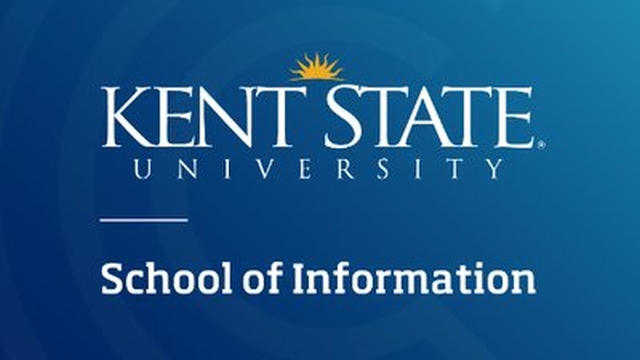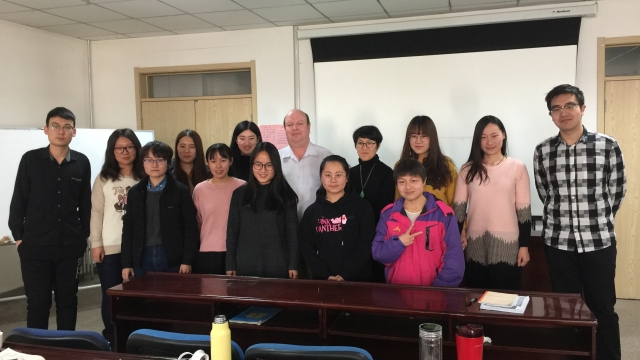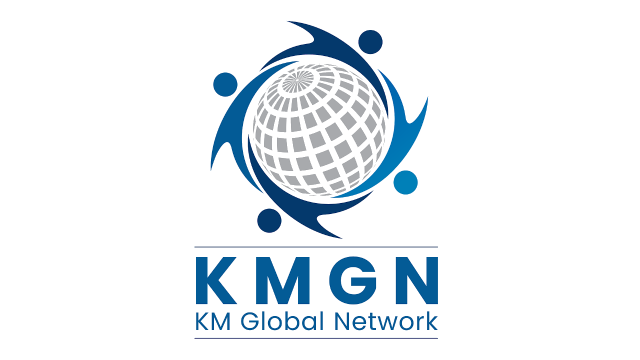Note: Content on this page is based upon contemporary information available as at the publication date. Courses can and do change regularly, please consult the institutional website for the latest information.
The Kent State Master of Science in Knowledge Management is a fully online program of study offered by the university’s School of Information. It can be pursued at the Graduate Certificate, Master, or PhD level. The program is described as:
[Preparing] professionals to serve as leaders in all types of organisations who can assess and evaluate organisations on knowledge management principles, including culture, learning, communities, and maturity. Graduates will be able to build strategy for effective knowledge management for organisations …
Students in the program learn principles, values, assessments, and best practices from their instructors and fellow students, many of whom are also professionals working in knowledge management. Through courses and internships, students are provided real-world, practical experience.
Students study five core courses covering:
| Foundational principles of knowledge management |
- Understand the nature of knowledge, and principles of collection versus connection
- Learn about core KM principles and processes, the KM life cycle, and KM social and technological tools
- Learn about KM’s effects, effectiveness, and ethics
- Understand how to create a KM strategy
- Understand how to manage KM issues such as culture and innovation
- Learn about KM practices in environments including business, government, military, non-profits, education, communities and societies
|
| Designing and implementing knowledge management in the workplace |
- Learn how to effectively create a Knowledge Management (KM) program
- Learn about factors that impact on success or failure
- Learn how to implement purposeful collaboration and effective networking
- Learn a complete KM program methodology from initial KM program formation to implementation planning with the goal of long-term sustainability
|
| Thought leadership and career development in knowledge management |
- Develop thought leadership strategies and innovative ideas to build your professional agenda and guide career planning
- Review your knowledge of business from a KM perspective and identify career path options
|
| Knowledge organisation structures, systems and services (course summary) |
- Demonstrate a higher level of understanding of the principles of taxonomies, thesauri, ontologies and other types of KOS through reading reports, product analyses, discussions, and independent projects.
- Apply various methods of knowledge organisation and representation in a set of projects that lead to the deliverables.
- Construct lists, taxonomies, thesauri, and basic ontologies to be used for a networked environment.
- Produce faceted, flat, hierarchical, and networked structures and understand their representational diagrams; create concept maps, semantic networks, knowledge graphs, etc.
- Design and evaluate KOS and applications.
- Describe and comment on the issues related to KOS in the networked environment.
- Explain the impact of KOS on searching, browsing, and discovery.
|
| Leadership and managerial assessment |
- Develop an understanding of the leadership process
- Build skills in leading others, leading themselves, and teamwork
|
Students must also complete 4-5 electives in KM or another related discipline such as Library Sciences, and a Master’s internship, research project, or thesis. Elective KM subjects include:
| Knowledge metrics and assessment |
- Learn how to design, build, and operate a measurement strategy that evaluates the effectiveness of a KM program in achieving business objectives
- Understand overall organisation measurement approaches such as focus groups, interviews, and surveys and applies them in a KM context
- Learn how to tailor presentation of metrics for specific audiences
|
| Knowledge, society and the Information Economy |
- Understand ideas and issues relevant to the role of knowledge management in society from sociological, economic, historical, and organisational management perspectives.
- Understand ideas essential to supporting the leadership of complex organisations within knowledge societies
|
| Communities of Practice (CoPs) |
- Understand fundamental concepts and principles of CoPs community of practice evaluation
- Learn how KM leaders launch, lead, and evaluate CoP programs as part of KM initiatives
- Learn how community managers succeed by applying proven practices for creating and cultivating communities
|
| Emerging technologies in knowledge management |
- Understand emerging digital technologies and their application to the digital workplace that complement human aspects of KM
- Understand the current and projected impacts of work process digitalization, artificial intelligence (AI) and mixed reality
|
| Business process management (BPM) |
- Understand how BPM and workflow management can be used to transform and manage organisational business processes (internal, external, manual and automated) for optimum efficiency, effectiveness and performance.
- Learn how to discover, analyse, model and automate workflow processes.
|
| Strategic intelligence |
- Learn about the intelligence cycle and the art and science of applying strategic intelligence for critical decision-making, planning, and response
- Learn how to perform needs analysis and to apply intelligence analysis resources, techniques, and technologies
- Apply competitive and business intelligence programs, processes, and tools to track competitors, markets and trends
- Learn how to acquire, organise, analyse, and disseminate strategic intelligence
|
| Organisational culture assessment |
- Examine different types of cultures and how each type influences a knowledge organisation, including the internal cultures of groups and communities
- Understand how culture influences the way that knowledge workers work, behave, and make decisions
- Learn how to conduct an organisational culture assessment
- Understand how the organisational cultures of multicultural, global, and virtual organisations may vary
|
| Semantic analysis methods and technologies |
- Learn about the practical contexts, methods and tools associated with semantic analysis
- Understand early life cycle aspects of semantics, such as identification and modelling of semantic problems, design of semantic solutions, and identification and implementation of appropriate semantic technologies
- Learn about the theory and practical application of natural language processing, concept extraction, classification, and automated summarization, including the distinction between rule-based and grammar-based approaches
|
The degree is supported by an advisory board of experienced KM professionals, including the well-known Stan Garfield. International enrolments are encouraged but sufficient foundational competency (eg English skills) need to be demonstrated.
A former Kent State student provided their feedback that the course has “many International Students going through their program [and is as] close to pure Knowledge Management as possible … a great program [which is] being revamped for class offerings and to reflect current needs”.
Dr Albright from Kent State recently advised on the SIKM mailing list that they launch a new offering in the upcoming fall and have to worked to “update, revise, and streamline the program … making it possible to complete in one year”. RealKM Magazine will share this once available. However, a record of this currently offered topics will likely remain useful as one of the last comprehensive “pure KM” offerings.
It would be highly commendable if Kent State University could provide a more detailed description of the “foundational principles of knowledge management” being taught in their offering now and going forward, since there remains significant divergence in the KM community on what the “foundational” aspects of knowledge management should be.
The online detail available on subjects remains scant and would benefit from expansion. For example, the Library Science subject description for the course on “knowledge organisation structures, systems and services” provides a much more useful description of study. Ideally, to progress standardisation in the field of KM study, sharing of the core texts and readings used for the course would yield maximum transparency and the ability to cross-compare topics of learning.





